The Truth About Far-Right Violence in Europe
By Liz Fekete
The “open society” is under threat in Europe. A vibrant, tolerant open society that respects human rights and a diversity of opinions is under threat from what Norbert Nieszery, the parliamentary leader of the Social Democrats in Mecklenburg-Vorpommern, Germany has described as an early form of far-right terror.
According to a new report from the London-based educational charity, the Institute of Race Relations it is not just in Greece, where the neo-Nazi Golden Dawn recently captured seven per cent of the vote, that far-right groups are intimidating voters, physically attacking their opponents and negatively influencing public life. In the heightened nationalistic climate that has accompanied austerity programs a violent, racist, nationalistic culture is appearing in politics as well as on the streets.
Pedlars of Hate: the violent impact of the European far Right is based on over one hundred cases which reveal a pattern of violence, from racist ranting and the peddling of hate online, to violence and death in the community, to the stockpiling of weapons in preparation for race war.
Pedlars of Hate tells two separate but interconnecting stories. The first relates to the new faultline in European extremist politics. Much of the far-right is withdrawing support from the electoral extreme right or populist anti-immigration parties which do not openly espouse violence and, as such, are regarded by the hardliners as having gone too far down the parliamentary road. The far-right is gaining strength, even as it embraces some of the horizontal autonomous forms of organising and the tone of the anti-globalisation movement.
Whether the far-right self-identify as fascists—clearly identifying themselves with their nation's fascist past or adopting the language of the Nazi era—or reach for newer, more culturally acceptable labels, fascism is what fascism does.
The second narrative that emerges in Pedlars of Hate is even more shocking. As the Institute of Race Relations warns in the preface to the report, there is not only a “lack of professionalism among key sections of European police and intelligence services” but a “police bias towards the far-right” and indications that “the intelligence services are developing infiltration schemes, which, because of a lack of democratic oversight, end up colluding with the far-right in ways that bring to mind the collusion of the Royal Ulster Constabulary with Loyalist paramilitaries in the North of Ireland.”
Furthermore, as the counter-jihadi movement and network of defence leagues attempt to encourage soldiers returning from Iraq and Afghanistan to extend the fight to the Muslim enemy within, the Institute of Race Relations warns of the dangers posed when anti-democratic tendencies on societal, institutional and security fronts combine. Czech counter-extremist expert Miroslav Mareš anticipates that in future we will see more serious crime committed by those who have worked in conflict zones and gained combat experience. The Institute of Race Relations asks whether the typical profile of the far-right terrorist is changing, from the skinhead in DMs to the disillusioned and demobilized soldier?
In one particular shocking case documented in the report a serving soldier of the 2nd battalion Yorkshire Regiment in the UK was found guilty of setting fire to a mosque, by running a gas pipe into the ground floor of the building from a nearby property. During the trial, evidence of the young soldier’s state of mind was presented in the form of his Facebook comments which included: “The time has come. They burn our poppies, we burn their place. Burn the lot of them out.”
The collected evidence in the report Pedlars of Hate indicate that we have arrived at a critical moment in the defence of open societies in Europe. Without intervention, the strength of these far-right movements can only grow.
The Institute of Race Relations is a grantee of the Open Society Foundations.
Liz Fekete is head of European research at the Institute of Race Relations and author of A Suitable Enemy: Racism, Migration and Islamophobia in Europe.

